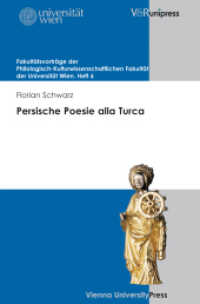- ホーム
- > 洋書
- > 英文書
- > Politics / International Relations
Full Description
This book explores how urban spaces encompass, shape and reconfigure the emotional landscapes and socio-cultural specters of their inhabitants. It highlights the arenas in which various politics and strategies of emotional relations are represented, created, enacted and regulated through the inhabitants' lives and lifestyles. Exploring this, the chapters in the volume bring together and analyze the myriad forms of intersections within and between urban centers in India and the Indian diaspora, as well as 'classed' emotions. The authors embark on scholarly inquiries to highlight the complex and fluid dynamics through which urban spaces and the class of their inhabitants question, attribute, influence and perpetuate the diverse emotional states and responses, and vice versa - they examine the ways in which emotive subjectivities, relations, experiences and practices question and influence multiple urban formations, power dynamics and spaces. They reveal how emotional and urban landscapes are not only represented but are also affected by the social class of the denizens.
Part of the Urban Futures series, the volume will be indispensable to scholars and researchers of urban studies, anthropology, sociology, cultural studies, urban planning, urban policy, public policy and architecture. It will also be of interest to the professional architects, urban designers, social geographers and policymakers.
Contents
1 Introduction: At the Intersections of Emotions, Social Class and Urbanity
2 Lived Emotions and Class Spaces: Care and 'Marriages at Old Age' in Kolkata
3 Living in Dog Years: An Autoethnography of a Multi-species Household
4 Becoming 'Serious Men': Politics of Emotion and the Disciplining of Desires in an Indian Coaching Town
5 Care and Class: Exploring Employer-Employee Relations in Mothering
6 Class, Religion and Caregiving: Inter-species Emotions and Interactions in a New Delhi Neighborhood
7 Of Old Bodies and New Homes: Filial Care among Transnational Indian Families
8 Delhi Night by Car: Middle Class, Emotions and Appropriating Urban Spaces








